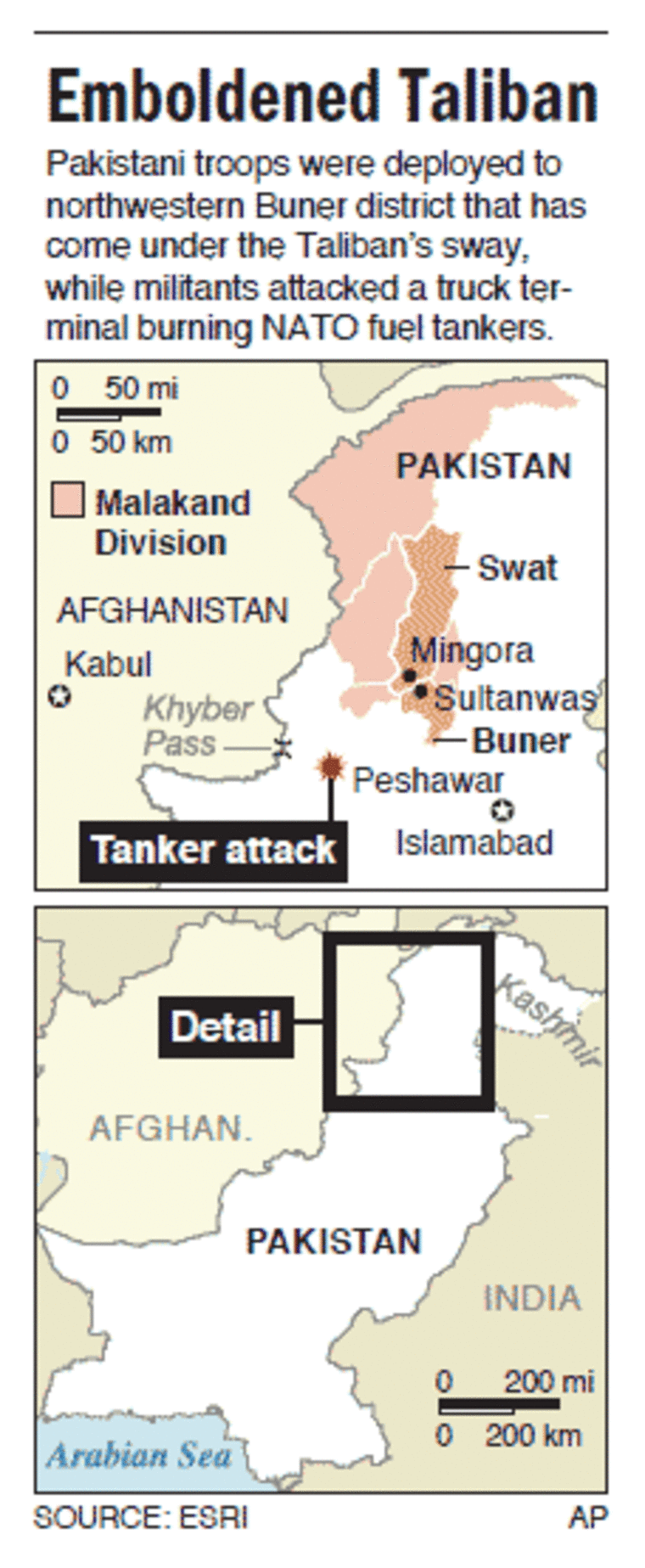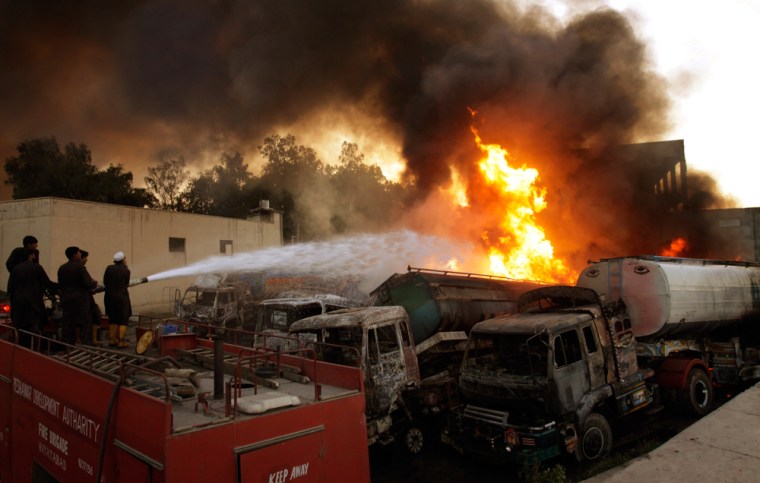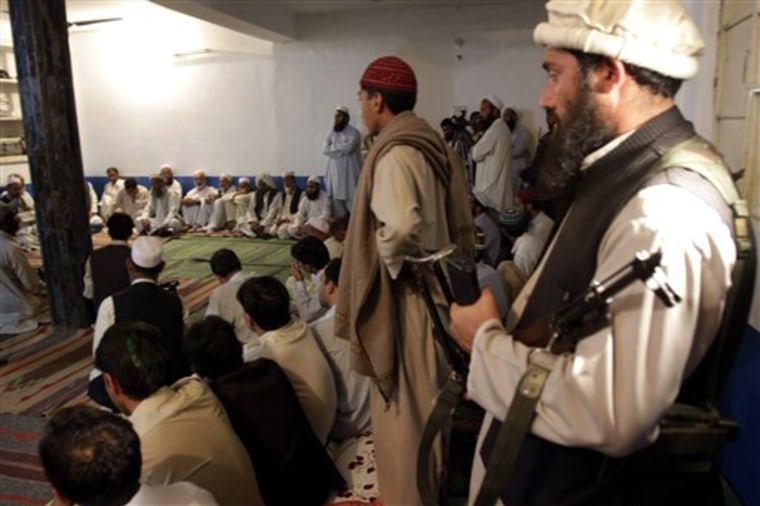Gunmen attacked a Pakistani paramilitary force sent to a Taliban-infiltrated district just 60 miles from the capital Thursday, killing a police officer and feeding growing doubts about the government's peace deal with extremists in the area.
A meeting between Taliban representatives and tribal elders ended with the militants making some concessions but no pledge to withdraw from Buner, where they have established bases since crossing over from their stronghold in the neighboring Swat Valley.
Militants also attacked a NATO truck terminal in the outskirts of Peshawar, the capital of the restive North-West Frontier Province, burning vehicles and sending a very visual message of their presence.
Swat's Taliban appear to be emboldened after their bloody, two-year campaign in the valley led the government to agree to a peace accord that imposes Islamic law in a wide swath of the northwest bordering Afghanistan.
Taliban in new area?
There were reports Thursday that fighters from the Swat Taliban also have entered another neighboring district, Shangla, said a security official who agreed to discuss the situation only if not identified because he was not authorized to speak to journalists.
Militants have made no secret of their desire to see Islamic law imposed across the country, and as they edge closer to Islamabad, unease about the peace deal is growing in Pakistan and in the West. The U.S. is especially concerned because it considers stability in Pakistan — and rooting out its militant sanctuaries — critical to success in the Afghan war.

U.S. Secretary of State Hillary Clinton told American lawmakers in an unusually blunt statement Wednesday that Pakistan's leaders were "basically abdicating to the Taliban." On Thursday, however, of the threat.
U.S. special envoy Richard Holbrooke talked to Pakistani President Asif Ali Zardari by telephone Thursday, but the president's office would not say if Swat or Buner were discussed. The chairman of the U.S. military's Joint Chiefs of Staff, Adm. Mike Mullen, was visiting Pakistan.
As reports filtered out about Taliban fighters moving into Buner — that they were patrolling roads, broadcasting radio sermons and ordering barbers to stop shaving beards — the government sent six platoons from the paramilitary Frontier Constabulary to the district this week.
Government official Syed Mohammed Javed confirmed the deployment but would not comment on the troops' purpose. Javed did not specify the number sent; a platoon typically has 30 to 50 members.
The troops were dispatched Wednesday, Javed said. Unidentified gunmen opened fire on one of the convoys Thursday, killing an escorting police officer and wounding another in the Totalai area, said Hukam Khan, a police official.
General says not to worry
How much force the government was willing to display remained unclear, especially after the army's spokesman, Maj. Gen. Athar Abbas, insisted the situation in Buner was not as dire as some felt. He said militants controlled less than 25 percent of the district, mostly its north.
"We are fully aware of the situation," Abbas said. "The other side has been informed to move these people out of this area."
Prime Minister Yousuf Raza Gilani insisted no group would be allowed to challenge the authority of the government, but a few lawmakers — including some who initially backed the peace deal with the Swat Taliban — said the administration had to do more to contain extremists.
"If the other party is not able to give us peace and expanding themselves to Buner and Shangla, then it is the government's duty to use its full strength to stop their expansion," said Haji Mohammad Adeel, a top member of the party that leads the provincial government in the northwest and entered into the accord in the first place.
"If the Taliban continue their advances at the current pace they will soon be knocking at the doors of Islamabad," added Fazl-ur-Rehman, head of the Jamiat-e-ulema-e-Islam, the country's largest Islamic party.
The provincial government agreed to the peace deal in February, but the president signed off on it only last week, under strong pressure from the national legislature.
The accord covers Swat, Buner, Shangla and other districts in the Malakand Division, an area of about 10,000 square miles near the Afghan border and the tribal areas where al-Qaida and the Taliban have strongholds.
Supporters have said the deal takes away the militants' main rallying call for Islamic law and will let the government gradually reassert control — a theory yet to be seriously tested.
Analysts said Buner is a wake-up call for a Pakistani government that has often seemed weak-willed in dealing with insurgents. But, they said, Islamabad is not in danger now.
"The military is going to be the major impediment" to taking the capital, said Hasan Askari-Rizvi, a leading political analyst. Still, he said, sympathizers in the capital could use the Buner advance as a rallying cry to cause unrest.
More than a half million people live in Buner.
No troops seen in key town
On Thursday, the bazaar in Buner's main town of Daggar and the road into the district were almost deserted, a visiting AP Television News reporter found. Police and government officials in Buner appeared to have either fled or were keeping a low profile, and there was no sign of Frontier Constabulary troops in the town.
The meeting of tribal elders and the Taliban in Daggar ended without notice the militants would leave.
A Taliban leader who goes by the name "Commander Khalil" said the militants agreed to stop patrolling in Buner, though they would keep armed guards in their vehicles.
"We are here peacefully preaching for Sharia (Islamic law). We don't want to fight," Khalil told an Associated Press reporter by phone.
Another Taliban leader, Maulana Muhammad Bashir, said the militants agreed not to target people who had opposed them in the past in Buner — a key demand of local leaders, some of whom had raised tribal militias to fight the Taliban.
Javed Khan, a top administrator in Buner, said the Taliban agreed to not exhibit weapons or interfere with government offices. The militants also promised to leave aid groups alone and return seized government vehicles, he said.
Nasir Laik, an elder at the Daggar meeting, said the militants could stay so long as they only preached.
According to officials, the Taliban have established a base in the village of Sultanwas and set up positions in the nearby hills. Residents say they have been broadcasting sermons by radio about Islam and warning barbers to stop shaving men's beards.
Officials hope to avoid a replay of the Swat conflict in Buner. In Swat, some two years of clashes between the Taliban and security forces killed hundreds and caused up to a third of the one-time tourist haven's 1.5 million residents to leave their homes.
Tough criticism from U.S.
The United States has become one of the deal's foremost critics.
"I think the Pakistani government is basically abdicating to the Taliban and the extremists," Clinton told lawmakers in a hearing Wednesday in Washington. But on Thursday she added that she thought Islamabad was beginning to recognize the severity of the threat posed by militants.
On Wednesday, Clinton said the Obama administration is working to convince Pakistan that its traditional focus on India as a threat has to shift to the Islamic extremists.
"Changing paradigms and mindsets is not easy, but I do believe there is an increasing awareness of not just the Pakistani government but the Pakistani people that this insurgency coming closer and closer to major cities does pose such a threat," the secretary of state said.
On Thursday, U.S. special envoy Richard Holbrooke called Pakistani President Asif Ali Zardari to discuss the situation in the region, Zardari's office said without specifying if Buner was mentioned. The call came as the chairman of the U.S. joint chiefs of staff, Adm. Mike Mullen, was in Pakistan for talks with officials.
NATO trucks burnedIn the attack on NATO, dozens of militants armed with guns and gasoline bombs burned five tanker trucks carrying fuel to NATO troops in Afghanistan, police said.

Gunmen attacked the truck depot near Peshawar before dawn on Thursday, hurling gasoline bombs that set fire to the five tankers.
Security guards fled, and the assailants escaped before police arrived.
NATO and the U.S. military insist that their losses on the transport route remain minimal and have had no impact on their expanding operations in Afghanistan. However, they have been seeking alternative routes through Central Asia.
Meanwhile, the Pakistani army killed at least 11 militants on the third day of an operation against insurgents in the northwest's Orakzai tribal region, a military statement said. The army has used airstrikes to take out militants hideouts in different pockets of the tribal region, and had already killed 27 militants in the past two days.
